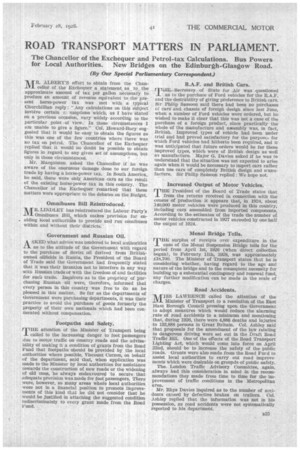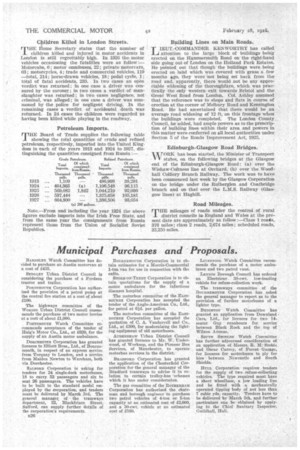ROAD TRANSPORT MATTERS IN PARLIAMENT.
Page 51

Page 52

If you've noticed an error in this article please click here to report it so we can fix it.
The Chancellor of the Exchequer and Petrol-tax Calculations. Bus Powers for Local Authorities. New Bridges on the Edinburgh-Glasgow Road.
(By Our Special Parliamentary Correspondent.) AIR' ALBERTS effort to obtain from the Chancellor of the Exchequer a statement as to the approximate amount of tax per gallon necessary to produce an amount of revenue equivalent to the present horse-power tax was met with a typical Churchillian reply : "Any calculations on this Subject involve certain 1.7 Aunptions which, as I have stated on a previous occasion, vary widely according to the particular point of view. In these circumstances I am unable to give a figure." Col. Howard-Bury suggested that it would be easy to obtain the figures as this was one of the few countries where there was no tax on petrol. The Chancellor of the Exchequer replied that it would no doubt be possible to obtain figures in regard to any given set of assumptions, but only in those circumstances.
Mr. Macquisten asked the Chancellor if he was aware of the enormous damage done to our foreign trade by having a horse-power tax. In South America, he said, there were only American cam as the result of the existing horse-power tax in this country. The Chancellor of the Exchequer remarked that these matters were appropriate to the debates on the Budget.
Omnibuses Bill Reintroduced.
MR. LINDLEY has reintroduced the Labour Party's Omnibuses Bill, which makes provision for enabling local authorities to provide and run omnibuses within and without their districts.
Government and Russian Oil.
A SEED what advice was tendered to local authorities IA as to the attitude of the Government with regard to the purchase of Soviet oil derived from Britishowned oilfields in Russia, the President of the Board of Trade said the Government had frequently stated that it was their intention not to interfere in any way with Russian trade or with the freedom of and facilities for such trade. Inquirers as to the propriety of purchasing Russian oil were, therefore, informed that every person in this country was free to do as he pleased in this matter. So far as the departments of Government were purchasing departments, it was their practice to avoid the purchase of goods formerly the property of their own nationals which had been confiscated without compensation.
Footpaths and Safety.
-rm attention of the Minister of Transport being called to the increasing danger to foot passengers due to motor traffic on country roads and the advisability of making it a condition of grants from the Road Fund that footpaths should be provided by the local authorities where possible, Viscount Curzon, on behalf of the department, said that, when application was made to the Minister by local authorities for assistance towards the construction of new roads or the widening of old ones, he always endeavoured to secure that adequate provision was made for foot passengers. There were, however, so many areas wheie local authorities were not in a financial position to promote improvements of this kind that he did not consider that he would be justified in attaching the suggested condition indiscriminately to every grant made from the Road Fund. R.A.F. and British Cars.
Es Secretary of State for Air was questioned
as to the purchase of Ford vehicles for the R.A.F. and the desirability of giving preference to British cars. Sir Philip Sassoon said there had been no purchases of cars and chassis of foreign design since last June, when a number of Ford vehicles were ordered, but he wished to make it clear that this was not a case of the purchase of a foreign product, since practically the whole of the manufacture and assembly was, in fact, British. Improved types of vehicle had been under trial and had proved satisfactory for the purpose , for which Ford vehicles had hitherto been required, and it was anticipated that future orders would be for those improved types, which were of British design as well as manufacture. Major G. Davies asked if he was to understand that the situation was not expected to arise again when it would be necessary to import cars rather than use cars of completely British design and iranufacture. Sir Philip Sassoon replied : We hope not.
Increased Output of Motor Vehicles, THE President of the Board of Trade states that from the returns received in connection with the census of production it appears that, in 1924; about 140,000 motor vehicles were produced in this country, including cars assembled from imported components. According to the estimates of the trade the number of motor vehicles constructed in 1927 exceeded by one half the output of 1924.
Menai Bridge Tolls.
FIHE surplus of receipts over expenditure in the _1 case of the Menai Suspension Bridge tolls for the period from April 1st, 1926 (when direct collection began), to February. 11th, 1928, was approximately £18,700. The Minister of Transport states that he is considering whether, having regard to the age and nature of the bridge and to the consequent necessity for building up a substantial contingency and renewal fund, any further modification can be made in the scale of charges.
Road Accidents.
MISS LAWRENCE called the attention of the Minister of Transport to a resolution of the East Ham Borough Council pressing upon the Government to adopt measures which would reduce the alarming rate of road accidents to a minimum and mentioning that, during 1926, there were 4,886 deaths and injuries to 133,888 persons in Great Britain. Col. Ashley said that proposals for the amendment of the law relating to dangerous driving were set out in the Draft Road Traffic Bill. One of the effects of the Road Transport Lighting Act, which would come into force on April 22nd, should be to increase the safety of the public roads. Grants were also made from the Road Fur d to assist local authorities to carry out road improvements which were desirable on grounds of public safety.
The. London Traffic Advisory • Committee, again, always had this consideration in mind in the recommendations they made from time to time for the improvement of traffic conditions in the Metropolitan area.
Mr. Rhys Davies inquired as to the number of accidents caused by defective brakes on trailers. Col. Ashley replied that the information was not in his possession, as road accidents were not systematically reported to his department.
Children Killed in London Streets.
rp HE Home Secretary states that the ntunbar of children killed and injured in motor accidents in London is still regrettably high, In 1926 the motor vehicles occasioning the fatalities were as follow :— Motorcabs, 6; motor omnibuses, 22; private motorcars, 63; motorcycles, 4; trade and commercial vehicles, 119 —total, 214; horse-drawn vehicles, 18; pedal cycle, 1; total of fatal accidents, 233. In two Cases an open verdict was returned; in one case a driver was censured bythe coroner ; in two cases a verdict of manslaughter was returned ; in two cases negligence, not criminal, was alleged ; in one case a driver was summoned by the police for negligent driving. In the remaining cases a verdict of accidental death was returned. In 24 eases the children were regarded as .having been killed while playing in the roadway.
Petroleum Imports.
THE Board of Trade supplies the following table showing the total quantities of crude and refined petroleum, respectively, imported into the United Kingdom in each of the years 1913 and 1924 to 1927, distinguishing the quantities consigned from Russia :
Note.—From and including the year 1924 the above figures exclude imports into the Irish Free State, and from the same year the consignments from Russia represent those from the Union of Socialist Soviet Republics.
Building Lines on Main Roads.
LIEUT.-COMMANDER KEN WORTHY has called attention to the large• block of buildings being erected on the Hammersmith Road on the right-hand side going out of London on the Holland Park Estates. He pointed out that though-the buildings were being erected On land which was covered with grass a few months ago, they were not being set back from the road and, apparently, there would not be any appreciable widening of the thoroughfare, which was practically • the only western exit towards Bristol and the Great West Road from London. Col. Ashley assumed that the reference was to shops and flats in course of erection at the corner of Melbury Road and Kensington Road. He had ascertained that there would be an average road widening of 12 ft. on this frontage when the buildings Were completed. The London County _ Council, he added, had ample powers as to the prescription of building lines within their area and powers in this matter were conferred on all local authorities under Section 5 of the Roads Improvement Act, 1925. . .
Edinburgh-Glasgow Road Bridges.
TORK has been started, the Minister of Transport V / states, on the following bridges at the Glasgow end of the Edinburgh-Glasgow Road : (a) over the Wishaw-Coltness line at Orchard, (b) over the Woodhall Colliery Branch Railway. The work was to have been commenced last week by the Glasgow Corporation on the bridge under the Rutherglen and Coatbridge branch and on that over the L.M.S. Railway (Glasgow lines) at Raghlil.
Road Mileages.
THE mileages of roads under the control of rural district councils in,England and Wales at the present date are approximately as follow :—Class 1 roads, 376 miles; class 2 roads, 2,674 miles ; scheduled roads, 35,250 miles.




















































































































